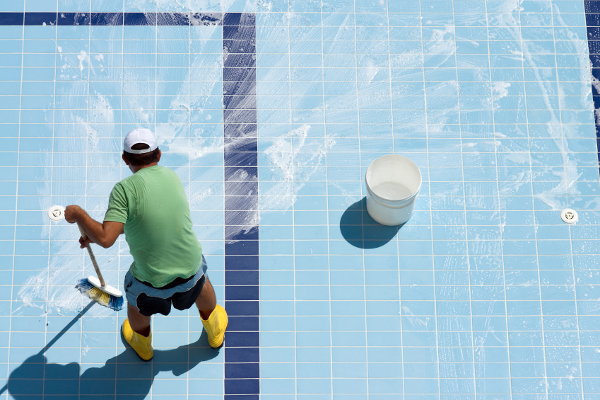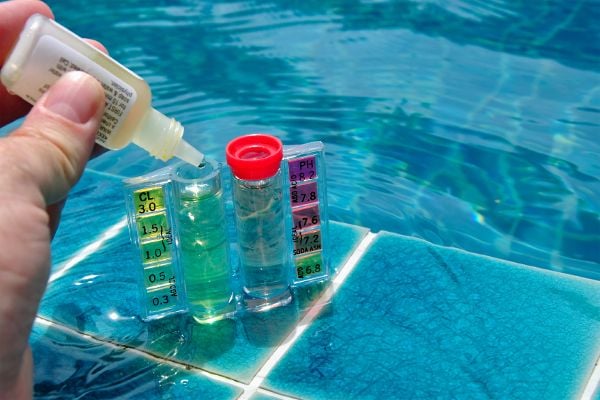The Great Pool Debate Salt Water vs. Chlorine
Cool relaxing water on a 95-degree day. How awesome does that sound?
Are you a pool person, a lake person, or an ocean person? Any way you look at it, when it's 95 degrees outside any kind of water will do to cool off. Or will it?
Just in case you aren't near a lake or an ocean and are thinking about putting in a pool, let's investigate which kind of pool is the way to go for your lifestyle.
Salt Water Pools
How Do They Work?
Just to be clear, salt water pools do have chlorine in them, but the chlorine level is typically lower in a salt water pool than in a traditional chlorinated one. Additionally, the chlorine found in a salt water pool isn’t added externally by you, but rather is created from chemical electrolysis that occurs within a salt water chlorinator or salt water generator that is part of the system. Because of the lower chlorine levels, salt water pools are less drying to the skin.
Upfront and Long-Term Costs
Salt water pools can be more expensive at the onset because you need to purchase a salt water generator. It will produce a steady flow of chlorine, stopping algae buildup and lengthening the life of the pool. In addition to the purchase price, there is also the electrical costs of keeping your generator operating constantly. Most pool maintenance experts believe your generator should run four to six hours a day in the winter and 10-12 hours daily in the summer. (The specifics for your pool may vary depending on weather conditions, frequency of use, and a number of other factors.) So, it’s important to monitor your generator when you first purchase it and work out the ideal schedule. You don’t want to have to spend the electricity to run it all day if you don’t have to, and you also don’t want to have it running so little that it doesn't do anything.
Even with all these costs, one of the things to keep in mind if you are thinking of a salt water pool is how long you plan on keeping it. The cost of the generator outweighs the cost of chlorine pool chemicals the longer you keep the pool. You also won’t have to constantly add other chemicals to the water to keep it clean, which cuts down on cost.
Other Concerns

Cleaning your salt water pool (other than skimming bugs and leaves) is only required once a year. This process involves draining the pool, changing filters, scrubbing surfaces, and inspecting the chlorine generator. Draining and refilling can be costly, time consuming, and labor intensive.
If you have dark surfaces around a salt water pool, chances are you will get some salt ring stains. Salt can be corrosive, so there is the possibility of some damage to the pool liner or any lights used in the pool. Your pool supplier can suggest the right liners and lights for a salt water pool.
Chlorine Pools
Chemical Requirements

Chlorine pools are much cheaper at the onset than saltwater pools, but they are somewhat harder to take care of in the long run. The pH balance in a chlorine pool is not consistent and will need vigilance to keep it maintained. When you have your pool installed, a maintenance list will come with it. Take a sample of your water to the pool supply store and you are sure to get a list of chemicals needed to keep the water in the pool clean and safe. In order for the chlorine to be effective, there are some other things you have to keep an eye on. The pH should be between 7.2 and 7.6, alkalinity between 100 and 150 parts per million and calcium at 200-300 parts per million. All of these figures will require careful and ongoing additions of various chemicals so depending on how perfect you want your pool water and how often your swimming may neutralize the sanitizing effects, the costs can add up.
Maintenance
Chlorine pools require constant surveillance whereas salt water pools stay clean with less work because of the constant flow of chlorine from the generator. Every three to four weeks you need to shock your pool to kill any excess bacteria. Make sure to follow the pool supplier's and the shock supplier’s directions. You will need to find out exactly how much chlorine is in the pool to know how much shock to add. It's a balance game.
It's a gross thing to think about, but chlorine mixes with all kinds of human output, including saliva and sweat, which turn into other chemicals called chloramines. Chloramines are responsible for the "chlorine smell" of pools, as well as skin and eye irritation. Even though chlorine kills contaminates, the chloramines stay in the water, requiring additional chlorine to remove them. Salt water pools kill chloramines faster than chlorine pools.
When compared to the less demanding maintenance regime of the single, annual drain and fill of a salt water pool, it’s kind of a toss up.
The Third Option
Pool disinfectant systems that use ultraviolet light also exist. These UV pool sanitizers are safe and use minimal chemicals. While this same technology has been used for decades to sanitize drinking water, these systems have not yet gained the popular foothold in the pool industry as chlorine and salt water.
As a result, getting an accurate picture of what realistic maintenance is like and real consumer feedback is difficult because the user base is still limited. Additionally, the popularity of the more common options means that more pool installers, cleaners, and retailers are more knowledgeable and helpful with those systems. Depending on your area (Europe uses UV in public pools and water parks), installing a UV disinfectant to your pool could ultimately prove costly just because you may have to seek out people with that very specific expertise.
The Verdict
Chlorine pools take commitment while salt water pools take a little more money up front. The technology for a safe, affordable chlorine pool has been around for about 50 years, while salt water pools have only been around since the 1980s. More and more hotels and water parks are converting to salt water pools mainly because they are less expensive to keep clean. Those with the money upfront for a salt water pool enjoy their choice because the maintenance is less than chlorine pools.
Choosing your best options depends on how dedicated you wish to be with your pool both financially and in terms of your time.
No comments:
Post a Comment